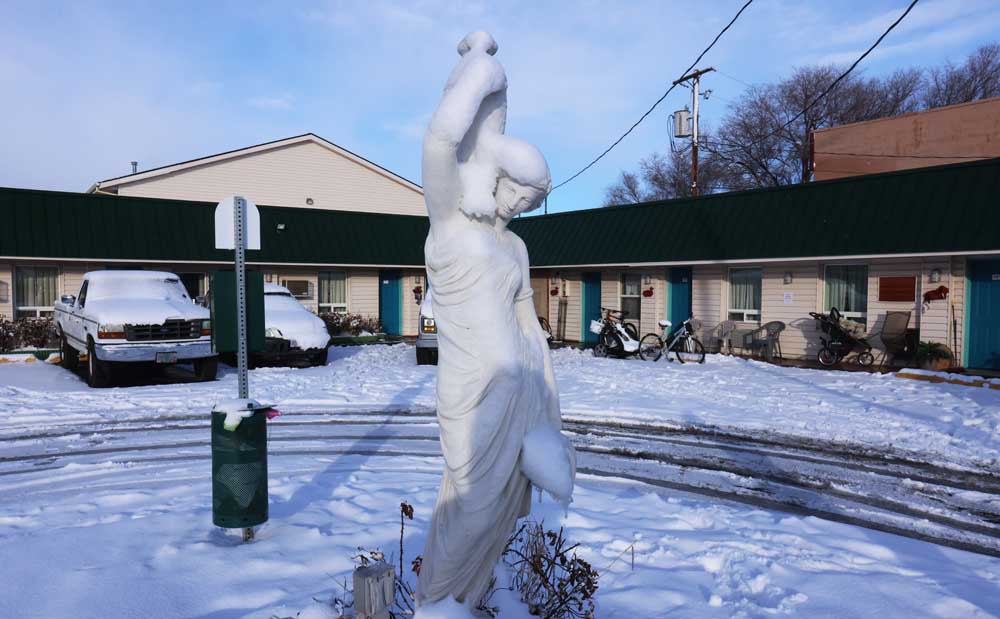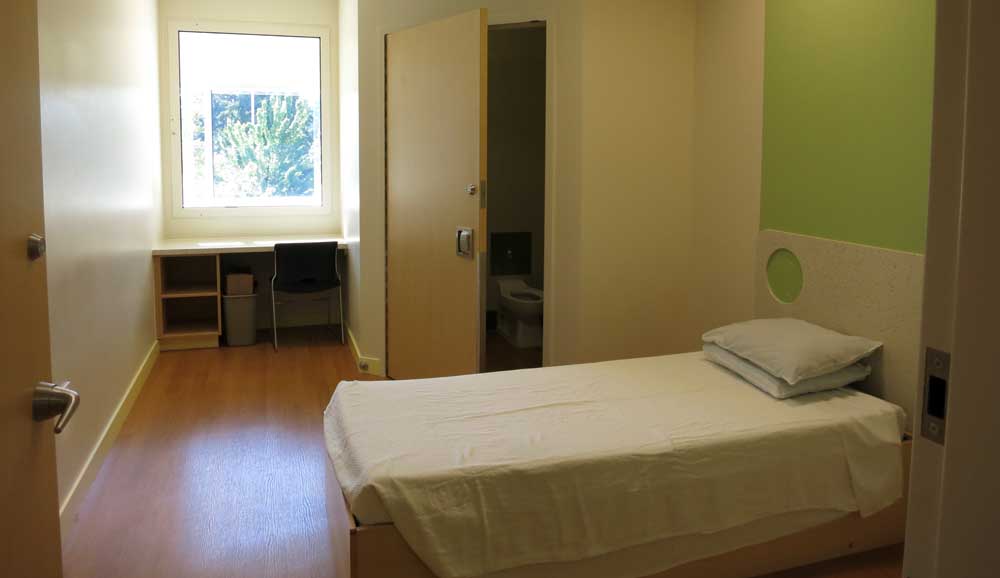How Central Oregon spent $14.7 million in state funds to fight homelessness
Published 5:45 am Wednesday, January 10, 2024

- A statue can be seen Tuesday at the Franklin Avenue Shelter in Bend, a facility Shepherd's House Ministries used state money to convert into a homeless shelter.
Just in time for the Wednesday deadline, Central Oregon met — and exceeded — the goals laid out after Gov. Tina Kotek declared a state of emergency on homelessness a year ago.
The governor’s declaration, known as Executive Order 23-02, was tied to millions in statewide funding to prevent people from slipping into homelessness, to create shelter beds where they didn’t previously exist and to move people into housing.
Governor gives more funding to Central Oregon’s homelessness
Central Oregon received $14.7 million, which had to be spent in less than nine months.
In Central Oregon, the state wanted 111 new emergency shelter beds. The region now has 114. The state wanted nonprofit providers to put 186 households back into housing, and, as of Monday, 187 households have been placed in housing. The state wanted local service providers to prevent 354 households from slipping into homelessness. They did just that with 366 households.
The funding was overseen by the Central Oregon Intergovernmental Council, and it was doled out to projects by a multiagency coordination group, which was made up of organizations and individuals from nonprofits and local governments.
Kotek extended the emergency declaration Tuesday, which could mean even more ambitious benchmarks tied to more funding.
But, for now, nonprofit service providers across the region are scrambling to put finishing touches on new facilities and wrap up efforts to move people from homelessness into shelter and housing units by Wednesday.
Homelessness in Central Oregon rises to highest number on record
What follows is a high-level look at where most of the $14.7 million from the state went and what kind of impact those funds made in Central Oregon.
Savage Commercial Properties: $4.64 million
Around $4.64 million was allocated to Savage Commercial Properties to convert the Old Mill & Suites Motel in Bend into a multifamily apartment complex that will house up to 75 households transitioning out of homelessness. The state gave the project an extension past Wednesday’s deadline due to construction complications, Katie Carter, COIC’s fiscal services manager wrote in an email.
The conversion will be complete in March, Carter said.
“This property will essentially be renovated within 10 months, an incredibly aggressive timeline under even the best circumstances,” Carter said.
Service provider benefit fund: $1.4 million
The service provider benefit fund, which is capped at roughly $1.4 million repays nonprofits for money spent on people who were previously without shelter who have been placed into housing. A total of 78 households were placed into housing through the fund, according to records from COIC.
Deschutes County Parole and Probation: $1.1 million
With about $1.1 million, Deschutes County purchased a house in Bend for people leaving prison who have restrictions on where they can live. That could include registered sex offenders or people who can’t live near minors. The property will be managed and overseen by an Oregon City-based nonprofit called Free on the Outside, said Deevy Holcomb, the county’s community justice director.
Formerly incarcerated people with residency restrictions experience higher rates of homelessness, Holcomb said.
“They tend to have so many broken connections,” she added.
That’s why it’s important to address an acute need with solutions that have proven to work for people on parole and probation, Holcomb said. The house requires residents to follow certain rules, including maintaining sobriety, rent payments and supervision from a peer. The first resident moved in on Friday.
Shepherd’s House Ministries: $1 million
In addition to more than $1 million funneled through the city of Bend for the Franklin Avenue Shelter, nonprofit Shepherd’s House received $577,500 to rehouse an estimated 30 households and another $508,109 for an estimated 46 emergency shelter beds.
City of Madras: $1 million
With about $1 million, Madras’ first-ever permanent homeless shelter will open its doors Wednesday night. It will be able to shelter up to 23 people, and it’s being run by the Jefferson County Faith-Based Network, a nonprofit that has been serving the county and the Warm Springs Indian Reservation in some form since 2010.
“You don’t get this type of funding every day, so there’s an immense opportunity that was seized,” said Nick Snead, the city of Madras’ community development director.
J Bar J Youth Services: $1 million
J Bar J Youth Services, a multifaceted nonprofit that focuses on serving runaway and homeless youth, spent about $1 million to create an estimated 13 shelter beds, and conduct outreach in Crook and Jefferson counties.
City of Bend: $1 million
The city of Bend spent around $1 million to move 61 people into housing at the Franklin Avenue shelter run by nonprofit Shepherd’s House Ministries. The shelter was once the Rainbow Motel, which the city purchased in 2022. It was converted into a transitional housing space in 2023, primarily for families with children and vulnerable populations in 2023.
Bend homeless shelter, sitting empty for months, gets funding
Not only did the units expand Shepherd’s House’s services, the motel gave people a place to go that didn’t previously exist, said Lynne McConnell, the city of Bend’s housing director.
“To be able to provide that is life-changing,” McConnell said
City of Redmond: $1 million
About $1 million went through the city of Redmond to Oasis Village, a low-barrier homeless shelter with small, individual units. Its first 20 residents are expected to move in Wednesday.
Totals
The remaining funds were spent by various nonprofit organizations throughout the region.
In all, $143,530 was spent on data reporting. Most of that, around $138,000 went to NeighborImpact, a basic needs assistance nonprofit, and $5,000 went to the city of Bend.
Around $772,500 was spent on administrative costs. Most of that, $540,000, went to COIC. More than $106,000 went to the city of Bend.
More than $840,000 was spent on street outreach.
The only money spent in Crook County was for the Prineville-based organization Redemption House, which used around $200,000 for outreach and food efforts.
More than $5.7 million was spent on creating emergency shelter beds in Central Oregon, and more than $7.2 million was spent on rapid rehousing housing efforts, which puts people formerly without shelter into temporary but stable housing.
Around $19,000 wasn’t spent, according to COIC records. A spokesperson for Oregon Housing and Community Services said because Kotek extended the emergency declaration by signing a new executive order Tuesday, unspent funds can, in some cases, be used after Wednesday to achieve the governor’s goals.
The re-housing goal was the most trying one to hit, said Tammy Baney, executive director of COIC.
“If we had units today available, we would’ve had households in them,” she said.
The needs of Central Oregon are unique in that a surplus of residential or commercial real estate doesn’t exist for the kinds of goals the governor’s office wanted.
“Our community is growing so rapidly,” Baney said. “We just don’t look like other parts of the state particularly Portland or Salem.”
Central Oregon awarded nearly $1 million to address youth homelessness








